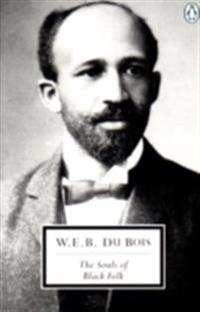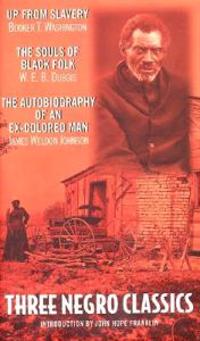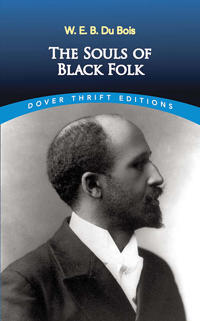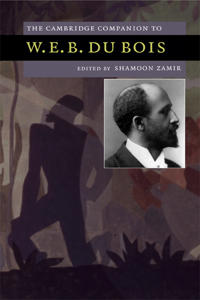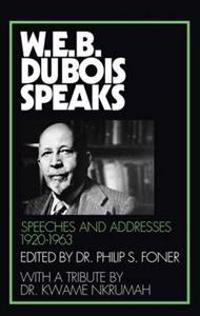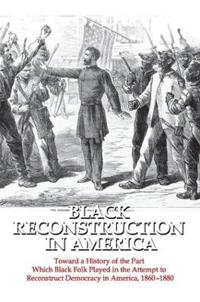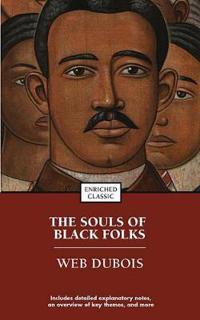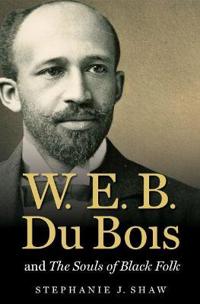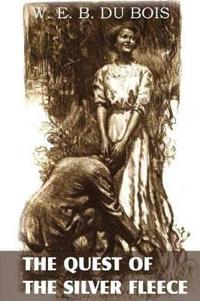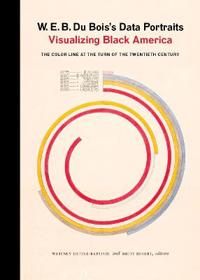The Souls of Black Folk (Storpocket)
avW. E. B. Du Bois
ISBN: 9780140189988 - UTGIVEN: 199609William Edward Burghardt Du Bois (1868-1963) is the greatest of African American intellectuals - a sociologist, historian, novelist, and activist whose astounding career spanned the nation's history from Reconstruction to the civil rights movement. Born in Massachusetts and educated at Fisk, Harvard[...]
Democracy's Reconstruction: Thinking Politically with W.E.B. Du Bois (Inbunden)
avLawrie Balfour
ISBN: 9780195377293 - UTGIVEN: 2011-03-24Three Negro Classics (Pocket)
avBooker T. Washington, W. E. B. Du Bois, James Weldon Johnson
ISBN: 9780380015818 - UTGIVEN: 1965-02UP FROM SLAVERYThe autobiography of Booker T Washington is a startling portrait ofone of the great Americans of the late nineteenth and early twentieth century. The illegitimate son of 'a white man and a Negro slave, Washington, a man who struggled for his education, would go on to struggle for the [...]
Souls of Black Folk (Häftad)
avW. E. B. Du Bois, Dover Thrift Editions
ISBN: 9780486280417 - UTGIVEN: 1994051903 landmark of black protest. Essential reading in African-American history.
The Cambridge Companion to W. E. B. Du Bois
ISBN: 9780521692052 - UTGIVEN: 2008-10W. E. B. Du Bois was the pre-eminent African American intellectual of the twentieth century. As a pioneering historian, sociologist and civil rights activist, and as a novelist and autobiographer, he made the problem of race central to an understanding of the United States within both national and [...]
The Souls of Black Folk (Pocket)
avW. E. B. Du Bois
ISBN: 9780553213362 - UTGIVEN: 2005-08-31Personal recollections are included in the controversial 1903 work about racism in America, depicting the spirit, status, and problems of black Americans since the time of emancipation. Reissue.[...]
W. E. B. Du Bois
ISBN: 9780745335056 - UTGIVEN: 2016-09On the 27th August, 1963, the day before Martin Luther King electrified the world from the steps of the Lincoln Memorial with the immortal words, "I Have a Dream", the life of another giant of the Civil Rights movement quietly drew to a close in Accra, Ghana. W.E.B. Du Bois was born in Massachusetts[...]
W.E.B. Du Bois on Crime and Justice (Inbunden)
avShaun L. Gabbidon
ISBN: 9780754649564 - UTGIVEN: 2007-03This is the first book to discern the contribution of Du Bois' work to criminology and criminal justice through a comprehensive review of his papers, articles and books. Beginning with reflections from his childhood, the author traces Du Bois' ideas on crime and justice throughout his life. This inc[...]
W. E. B. Du Bois
ISBN: 9780805088052 - UTGIVEN: 2009-08William Edward Burghardt Du Bois - the premier architect of the civil rights movement in America - was a towering and controversial personality, a fiercely proud individual blessed with the language of the poet and the impatience of the agitator. Now, David Levering Lewis has carved one volume out o[...]
Black Reconstruction in America (Häftad)
avW. E. B. Du Bois
ISBN: 9781412846202 - UTGIVEN: 2013-05After four centuries of bondage, the nineteenth century marked the long-awaited release of millions of black slaves. Subsequently, these former slaves attempted to reconstruct the basis of American democracy. W. E. B. Du Bois, one of the greatest intellectual leaders in United States history, evalua[...]
The Souls of Black Folk (Pocket)
avW E B Du Bois
ISBN: 9781416500414 - UTGIVEN: 200508Enduring Liturature Illuminated by Practical Scholarship A revolutionary collection of essays about the African-American experience at the turn of the twentieth century. This Enriched Classic Edition includes: • A concise introduction that gives readers important background information •[...]
The Souls of Black Folk (Häftad)
avW. E. B. Du Bois
ISBN: 9781420925852 - UTGIVEN: 200501One of the most widely read and influential works in African American literature, "The Souls of Black Folk" is W.E.B. Du Bois's classic collection of essays in which he details the state of racism and black culture at the beginning of the 20th century. Often autobiographical, "The Souls of Black Fol[...]
W. E. B. Du Bois
ISBN: 9781442207400 - UTGIVEN: 2015-07W. E. B. Du Bois was one of the most prolific African American authors, scholars, and leaders of the twentieth century, but none of his previous biographies have so practically and comprehensively introduced the man and his impact on American history as noted historian Shawn Alexander's W. E. B. Du [...]
W. E. B. Du Bois' Exhibit of American Negroes (Inbunden)
avEugene F. Provenzo
ISBN: 9781442223936 - UTGIVEN: 2013-08"The problem of the Twentieth Century is the problem of the color-line." This quote is among the most prophetic in American history. It was written by W. E. B. DuBois for the Exhibition of American Negroes displayed at the 1900 Paris Exposition. They are words whose force echoed throughout the Twent[...]
W. E. B. Du Bois and the Souls of Black Folk
ISBN: 9781469626437 - UTGIVEN: 2015-08In this book, Stephanie J. Shaw brings a new understanding to one of the great documents of American and black history. While most scholarly discussions of The Souls of Black Folk focus on the veils, the color line, double consciousness, or Booker T. Washington, Shaw reads Du Bois' book as a profoun[...]
W. E. B. Du Bois's Data Portraits
ISBN: 9781616897062 - UTGIVEN: 2018-10The colorful charts, graphs, and maps presented at the 1900 Paris Exposition by famed sociologist and black rights activist W. E. B. Du Bois offered a view into the lives of black Americans, conveying a literal and figurative representation of "the color line." From advances in education to the ling[...]

